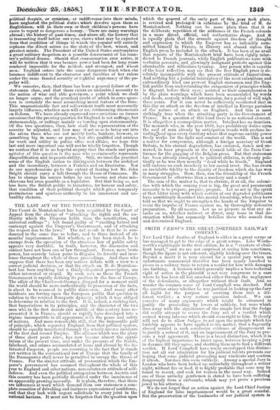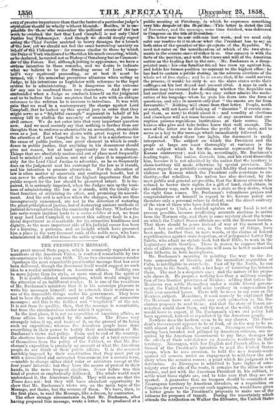SMITH VERSUS THE GREAT.NORTHERN RAILWAY COMPANY.
Tar. Lord Chief Justice of England is either in a great scrape or has managed to get to the edge of a great scrape. Like Words- worth's nightingale in the first edition, he is a "creature of ebul- lient heart," and we are not surprised at seeing him sometimes, though the figure is not coherent, slightly kicking over the traces. Beyond a doubt it is very absurd for a special jury when an unfortunate commercial traveller has been nearly knocked to pieces in a railway train to return a verdict for him with damages one farthing. A decision which generally implies a bare technical right of action in the plaintiff is not very congruous to a case where he has been all but smashed either through the negligence of the defendants, or altogether without their fault. And no wonder the common sense of Lord Campbell was shocked. Bat the question arises whether he was justified in locking up the Jury all night for the purpose of coercing them into a dif- ferent verdict ; a very serious question indeed. We can conceive of many arguments which might be advanced to justify the proceeding by lovers of subtlety, but none whioh does away with the significance of the simple fact that the Judge did really attempt to coerce the Jury out of a verdict which seemed wrong into one which should seem right to him. It clearly will not do to allow Judges to act upon the principle which his lordship appears to have applied to the matter, that a flagrantly absurd verdict is such conclusive evidence of disagreement as to justify a refusal of it, and an imprisonment of the Jury to pro- cure a real agreement. There is a broad distinction, which it is of the highest importance to insist upon, between keeping a jury in durance till they agree, and shutting them up to find a different verdict. If Lord Campbell have really overstepped tins distinc- tion not all our admiration for his judicial talents prevents our hoping that some judicial proceeding may vindicate and confirm it afresh. Nor does this seem unlikely. Among a special Jury in London who have been locked up unlawfully throughout a winter night, without fire or food, it is highly probable that some may be found to resent, and seek for redress in the usual way. Indeed. one of these unlucky gentlemen is stated to have been suffering dangerously from a carbuncle, which may yet prove a precious jewel to his attorney.
We do not forget that an action against the Lord Chief Justzioe of England for false imprisonment would be a great scandal.. But the preservation of the landmarks of our judicial system is ev -that the Instreota particular judge's
rephteit dtintheithlb Wholly , Besides ; 'it is iin- pessible thobOrêmentbee thevolitleal everiiii of the last week to orieldokithre' feet- that Lord CemPbell is net only Chief Justice but 'Fislitaceikeie . And thdagh We shouki;deeplyeregket seeing the Chief leTtieteee ninleted- in heavy damages -feeei bteeh- ofthe
law; ykeiee effienild not feel the saineelintrowin eatitiety on behalf of the' Fislimimeket ; for -reasons.' efinilar to those by *hick the Duke of York vindiekted he Sheridan his much eweethig; as he deelatedi lie etnted not as Ilishopef Osnabtirg but as Cemmaite ' der of thePertese 'tut; although jeetinginappeerance, ,,We have 'a' serions*IiitentiOn. *in these reinarks, and we desire to -indicate what 'Weebelieve to he the , fenndhig cause -of Lord Camp- We' very equivoeid proCeeding, at at best it. must ' be tetMed, viz. his*nnewhat precarious allusions when aeting, Xtelige, to his intentions as Legislator with reference to the Ieral syettni he 10,adbiinistering. It -is dangerous in the extreme' for' any 'One to 'confound these two• characters, -And they are einefoninied *hen a Judge so conduets himself On thejedgment seatto'indime the least suspicion that he acts with an oblique reference to the reforms he is anxious to introduce. It was with
- that we read' in a contemporary, the charge against Lord pbell; that he locked up this special jury in &dee that they might serve ais'a "frightful example" argument in behalf of his canting 'bill to abolish the necessity of unanimity in juries in ciivil mews. We do not enter into that very important question now. And we-need scarcely say that nothing is feather from out thoughte than to endorse so abominable an accusation, abominable even as a jest. But what we desire with great respect to draw the attention of Lerd Campbell to 'is, that • it is a misfortune for the cause Of public justice, one great element in which is confi- dence in public justice, that anything in his demeanour should give not reason, but at least opportunity for such a• charge. Things that are absolutely useless and out of place Most frequently lead to uric-chief ; and useless and out of place it is unquestion- ably for the Lord Chief Justice to advertize, as he so frequently does on the judgment seat his contempt for the law as it stands, and his intention to procure alterations. For the alteration of law is often matter of uncertain and contingent benefit, but it can never be otherwise than of the highest importance that the public respect for the law should be preserved intact. It is im- paired, it is seriously impaired, when the Judges mix up the busi- ness of administering the law as it stands, with the totally dis- tinct function of criticizing its effect, and promising its amend- ment. And the evil is not less when the changes, which are thus incongruously announced, are not in the direction of restoring the great principles of justice, but of destroying ancient methods of judicial determination like the unanimity of the Jury. Whether the late serio-comic incident leads to a cause celebre or not, we trust it may lead Lord Campbell to correct this solitary fault in a ju- dicial deportment as remarkable for its attractive kindliness and dignity, as the more important side of his judicial career has been for a learning, a patience, and an insight which have procured him a place in the very foremost rank of the noble men, who have administered in different times the noble system of English law.



























 Previous page
Previous page